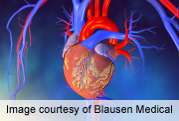Angiotensin receptor blockers reduce no-reflow post-PCI

(HealthDay) -- For patients with acute myocardial infarction (AMI), pretreatment with angiotensin receptor blockers (ARBs) is linked with reduced incidence of the no-reflow phenomenon after percutaneous coronary intervention (PCI), according to a study published online April 10 in Cardiovascular Therapeutics.
To investigate the role of early ARB treatment in the development of no-reflow after infarction, Tau Hu, from Xijing Hospital in Xi'an, China, and colleagues followed 276 patients with AMI who underwent successful PCI. No-reflow was evaluated by the Thrombolysis in Myocardial Infarction (TIMI) frame count method using angiographic images collected after PCI and stenting, with a TIMI flow grade <3 indicative of no-reflow.
In the 51 patients receiving chronic ARB before admission, the researchers found a reduced incidence of no-reflow compared to those not receiving ARB treatment (8.7 versus 26.7 percent; P = 0.003). There was no significant difference in the incidence of the no-reflow phenomenon for patients with and without hypertension. ARB pretreatment, but not blood pressure, was a significant predictor of no-reflow.
"Chronic pretreatment of ARB is associated with the reduction of the no-reflow phenomenon in patients with reperfused AMI and could preserve microvascular integrity after AMI independent of blood pressure lowering, which may contribute to better functional recovery," the authors write.
More information:
Abstract
Full Text (subscription or payment may be required)
Copyright © 2012 HealthDay. All rights reserved.
















